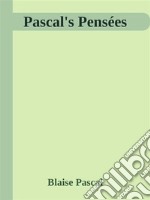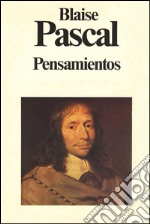Blaise Pascal eBooks
eBooks editi da Blaise Pascal
Pascal's Pensées. E-book. Formato EPUB Blaise Pascal - Blaise Pascal, 2017 -
Blaise Pascal was a French mathematician, physicist, inventor, writer and Christian philosopher. He was a child prodigy who was educated by his father, a tax collector in Rouen. Pascal's earliest work was in the natural and applied sciences where he made important contributions to the study of fluids, and clarified the concepts of pressure and vacuum by generalising the work of Evangelista Torricelli. Pascal also wrote in defence of the scientific method.In 1642, while still a teenager, he started some pioneering work on calculating machines. After three years of effort and 50 prototypes, he built 20 finished machines (called Pascal's calculators and later Pascalines) over the following 10 years,[4] establishing him as one of the first two inventors of the mechanical calculator.Pascal was an important mathematician, helping create two major new areas of research: he wrote a significant treatise on the subject of projective geometry at the age of 16, and later corresponded with Pierre de Fermat on probability theory, strongly influencing the development of modern economics and social science. Following Galileo Galilei and Torricelli, in 1646, he rebutted Aristotle's followers who insisted that nature abhors a vacuum. Pascal's results caused many disputes before being accepted. In 1646, he and his sister Jacqueline identified with the religious movement within Catholicism known by its detractors as Jansenism.His father died in 1651. Following a religious experience in late 1654, he began writing influential works on philosophy and theology. His two most famous works date from this period: the Lettres provinciales and the Pensées, the former set in the conflict between Jansenists and Jesuits. In that year, he also wrote an important treatise on the arithmetical triangle. Between 1658 and 1659 he wrote on the cycloid and its use in calculating the volume of solids.Pascal had poor health, especially after the age of 18, and he died just two months after his 39th birthday (FONT: Wikipedia)
Pensamientos. E-book. Formato EPUB Blaise Pascal - Blaise Pascal, 2016 -
Los Pensamientos de Blaise Pascal (1623-1662) no es un libro póstumo sino, en feliz expresión del mejor y más reciente analista de la obra pascaliana, Michel Le Guern, «los papeles de un muerto», la reunión de las notas y observaciones recogidas por Pascal para escribir un libro que, desde la heterodoxia de la escuela jansenista de Port-Royal, pretendía hacer la apología de la religión cristiana. Lo que se encontró a su muerte apenas consistía en «un montón de pensamientos apartados para una gran obra», según su sobrino, que redactó el prefacio a la primera edición de los Pensamientos, aparecida en 1670. El estado de inacabamiento de la obra y el correr de los siglos parecen haber negado al libro lo que quería ser, una apología religiosa. Bajo ella subyace lo que hoy resulta más actual en Pascal: una visión totalmente nueva del hombre, considerado desde el ascetismo jansenista, que ya habían practicado antes Séneca y sus seguidores, de quienes Pascal recoge, por ejemplo, la idea nuclear de su comprensión de la condición humana: la agitación, la inquietud, que motiva la constante huida del hombre fuera de sí para evitar verse, mirarse en el espejo propio, recapitularse entre los dos cabos y fines de su existencia: «El hombre no es más que una caña, el más débil de los seres creados, pero una caña pensante»… Y eso son los Pensamientos, la apasionada lamentación lírica de una condición humana que sufre.
Pascal's Pensées. E-book. Formato Mobipocket Blaise Pascal - Blaise Pascal, 2017 -
Blaise Pascal was a French mathematician, physicist, inventor, writer and Christian philosopher. He was a child prodigy who was educated by his father, a tax collector in Rouen. Pascal's earliest work was in the natural and applied sciences where he made important contributions to the study of fluids, and clarified the concepts of pressure and vacuum by generalising the work of Evangelista Torricelli. Pascal also wrote in defence of the scientific method.In 1642, while still a teenager, he started some pioneering work on calculating machines. After three years of effort and 50 prototypes, he built 20 finished machines (called Pascal's calculators and later Pascalines) over the following 10 years,[4] establishing him as one of the first two inventors of the mechanical calculator.Pascal was an important mathematician, helping create two major new areas of research: he wrote a significant treatise on the subject of projective geometry at the age of 16, and later corresponded with Pierre de Fermat on probability theory, strongly influencing the development of modern economics and social science. Following Galileo Galilei and Torricelli, in 1646, he rebutted Aristotle's followers who insisted that nature abhors a vacuum. Pascal's results caused many disputes before being accepted. In 1646, he and his sister Jacqueline identified with the religious movement within Catholicism known by its detractors as Jansenism.His father died in 1651. Following a religious experience in late 1654, he began writing influential works on philosophy and theology. His two most famous works date from this period: the Lettres provinciales and the Pensées, the former set in the conflict between Jansenists and Jesuits. In that year, he also wrote an important treatise on the arithmetical triangle. Between 1658 and 1659 he wrote on the cycloid and its use in calculating the volume of solids.Pascal had poor health, especially after the age of 18, and he died just two months after his 39th birthday (FONT: Wikipedia)

